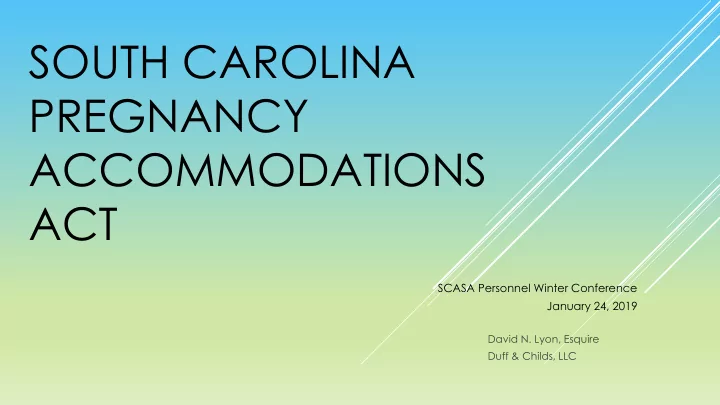

SOUTH CAROLINA PREGNANCY ACCOMMODATIONS ACT SCASA Personnel Winter Conference January 24, 2019 David N. Lyon, Esquire Duff & Childs, LLC
INTENT To combat pregnancy discrimination; • Promote public health; • Ensure full and equal participation for women in the • labor force; By requiring employers to provide reasonable • accommodations to employees for medical needs arising from pregnancy, childbirth, or related medical conditions.
BACKGROUND Two-thirds of South Carolina women who gave birth • in the last year were employed. Some women may develop pregnancy-related • conditions that require minor adjustments at work. Pregnant employees denied accommodations may • be at risk of complications that jeopardize their health and the health of their child. https://www.scwren.org/ •
BACKGROUND “Current workplace laws are inadequate to protect pregnant women from being forced out or fired when they need a simple, reasonable accommodation in order to stay on the job.” Family Medical Leave Act provides eligible employees with up to 12 weeks of • unpaid, job-protected leave per year.
BACKGROUND “Current workplace laws are inadequate to protect pregnant women from being forced out or fired when they need a simple, reasonable accommodation in order to stay on the job.” American With Disabilities Act (ADA) ADA mandates that certain employers provide • reasonable accommodations to employees with disabilities; Pregnancy itself is not a disability, but complications • due to pregnancy can be
BACKGROUND “Current workplace laws are inadequate to protect pregnant women from being forced out or fired when they need a simple, reasonable accommodation in order to stay on the job.” Pregnancy Discrimination Act of 1978 Amended Title VII of the Civil Rights Act of 1964 to • prohibit sex discrimination on the basis of pregnancy.
BACKGROUND “Current workplace laws are inadequate to protect pregnant women from being forced out or fired when they need a simple, reasonable accommodation in order to stay on the job.” Young v. United Parcel Service, Inc. (2015) The United States Supreme Court held that a pregnant • employee could make a PDA discrimination claim by demonstrating that the employer denied her request for an accommodation (light duty), but granted that accommodation to others for different non-pregnancy related reasons.
PROTECTED CLASS The SC Human affairs law now explicitly prohibits • discrimination on basis of “pregnancy, childbirth, or related medical conditions, including, but not limited to lactation.” Women affected by pregnancy, childbirth, or related • medical conditions must be treated the same for all employment-related purposes.
REASONABLE ACCOMMODATIONS Interactive Process Step 1 – Accommodation request by employee • Step 2 – Information gathering if necessary • Step 3 – Formulate accommodations (ideally, in • conjunction with employee)
REASONABLE ACCOMMODATIONS • More frequent or longer break periods; • More frequent bathroom breaks; • Providing a private place, other than a bathroom stall for the purpose of expressing milk; • Modifying food or drink policy; • Providing seating or allowing the employee to sit more frequently, if the job requires the employee to stand;
REASONABLE ACCOMMODATIONS • Providing assistance with manual labor; limits on lifting; • Temporarily transferring the employee to a less strenuous or hazardous vacant position, if qualified; • Providing job restructuring or light duty, if available; • Acquiring or modifying equipment or devices necessary for performing essential job functions; and • Modifying work schedules.
REASONABLE ACCOMMODATIONS Not required: • Hire new employees that the employer would not have otherwise hired; • Discharge an employee, transfer another employee with more seniority, or promote another employee who is not qualified to perform the new job;
REASONABLE ACCOMMODATIONS Not required: • Create a new position, including a light duty position for the employee, unless a light duty position would be provided for another equivalent employee; or • Compensate an employee for more frequent or longer break periods, unless the employee uses a break period which would otherwise be compensated.
UNLAWFUL EMPLOYMENT PRACTICES • Punish or refuse to hire employees for requesting or using a reasonable accommodation. • Require an employee to take leave under any law, if another reasonable accommodation can be provided. • Require an employee to accept an accommodation if the individual doesn’t have a known limitation or if the accommodation is unnecessary to perform the job.
NOTICE AND POSTING REQUIREMENTS • By September 14, 2018, provide written notice to all employees of the right to be free from discrimination for medical needs arising from pregnancy, childbirth or other related medical conditions. • For new employees – written notice at the commencement of their employment • Update SHAC Poster.
ADDITIONAL CONSIDERATIONS Update EOE and other non-discrimination statements. • Revise policies regarding workplace accommodations • to include reference to pregnancy.
DISCLAIMER • The information contained in this presentation is intended for informational purposes only. It is not intended to be legal or professional advice. The information contained herein was last updated on January 24, 2019, and is subject to change. Given the changing nature of laws, Duff & Childs, LLC assumes no responsibility or liability for, the accuracy or completeness of, or any errors or omissions in, any information contained herein. The application and impact of laws can vary widely based on the specific facts involved. If you have specific questions relating to any of the topics covered in this presentation, please consult an attorney at our firm.
Recommend
More recommend